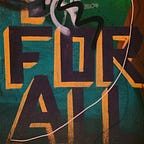It’s one thing for governments to abandon people, they’ve been doing that since the beginning of time. But as communities we were led to believe in the good in people, and to put energy into the ‘greater good’. We invested a lifetime of time, energy, money and expertise into building a community of paid and unpaid people around a disabled person, only to see that community evaporate at the very moment that community is needed.
It is heartbreaking watching the terror of people with disabilities and those who love them. People who must rely on others to survive and thrive, who have no choice but to rely on others. Rely on communities that say they will always be there, and then they aren’t.
We have seen communities come into their own in other disasters — floods, cyclones, bushfires. Mud armies march into affected areas cleaning out people’s homes. Rivers of money flowing towards victims who have become homeless. And colonies of well-wishers descend and work together to rebuild whole towns.
But not it seems, in a pandemic.
Many can relate to when someone close to them dies — who steps up and who steps back? The community we invested in, believed in and loved breaks down just when we need it. In time we’ll see if a new one emerges but for now, we are left with a gaping wound of confusion, sadness, rage and grief. Those we thought would be there for us and our loved ones, abandon ship. Families, friends, allies, paid workers. All of them*.
The covid pandemic started off OK, even hopeful. Many words about protecting our vulnerable population, people with disabilities to be ahead of the queue for vaccinations. But it didn’t last once the system came under pressure. Suddenly, hospitals talk about triage (guess who doesn’t get on the top of that list?), businesses talk about profits and the general population talk about themselves as individuals protecting their freedoms.
I’m sure once we are out the other side there will be light again, but it won’t ever be the same. We can no longer trust anyone. Not completely.
For us, it has been a stark reminder on what can go horribly wrong when we are no longer here to care for, or oversee the care for our loved ones. People we pay who say they are loyal won’t be believed until they’ve proven it. Friends, families and allies who say they can be counted on, won’t be believed until they demonstrate it. This is where the sadness lies. Before covid we felt safer, more in control and more trusting of those we must rely on.
Communities are nebulous, ethereal. They ebb and flow with the political and social tide. With great grief, terror and anger we have come to realise it cannot be reliably counted on.
I’ve never known the level of this kind of rage. It’s the type of rage that makes you want to commit a crime — one that makes you yell in the faces of politicians. One where you must restrain yourself from screaming at those who you have heavily invested in. Those to who you have accommodated and provided flexibility and understanding. Those you have trained, employed and mentored, to keep you and your loved ones and others safe. Those who we have provided a community for. It feels like a betrayal of the most fundamental kind.
I hear the cries “we are worried about ourselves and our own families”. Sure. But can’t both things co-exist? Can’t we be concerned about our own situation AND be loyal to those we pledged our service and support to? Can’t we attend to our own needs AND attend to the needs of others together? Can’t we be scared AND help others to manage their fears? After all, this is what we have done for you, our fears for ourselves have been our fears for you too.
I’m a little tired of those same people who have let us down, asking us to see it from their point of view.
No.
We have done that already and have been doing that all along. Now that we are asking it of you, you won’t.
Won’t, not can’t.
I don’t know how this will play out. There will be an end to the pandemic at some point, things will settle into some kind of new normal and life will be a little more predictable. But for us, we are wounded beyond repair. We will never forget how you’ve abandoned us, our loved ones and the cohort of humanity we represent.
And it is difficult to imagine that there will be a time that we will ever forgive you either.
*for those few that do show up, this blog is clearly not directed at you
